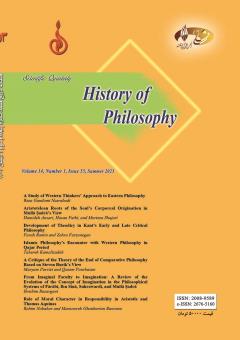-
-
List of Articles
-
Open Access Article
1 - Editor's Note
Hossein Kalbasi Ashtari -
Open Access Article
2 - A Study of Western Thinkers’ Approach to Eastern Philosophy
Reza Gandomi Nasrabadi -
Open Access Article
3 - Aristotelean Roots of the Soul’s Corporeal Origination in Mullā Ṣadrā’s View
Hamideh Ansari Hassan Fathi Morteza Shajari -
Open Access Article
4 - Development of Theodicy in Kant’s Early and Late Critical Philosophy
Farah Ramin Zahra Farzanegan -
Open Access Article
5 - Islamic Philosophy’s Encounter with Western Philosophy in Qajar Period
Tahereh Kamalizadeh -
Open Access Article
6 - A Critique of the Theory of the End of Comparative Philosophy Based on Steven Burik’s View
Maryam Parvizi Ghasem Pourhasan -
Open Access Article
7 - From Imaginal Faculty to Imagination: A Review of the Evolution of the Concept of Imagination in the Philosophical Systems of Fārābī, Ibn Sīnā, Suhrawardī, and Mullā Ṣadrā
Ibrahim Bazargani -
Open Access Article
8 - Role of Moral Character in Responsibility in Aristotle and Thomas Aquinas
Rahim Nobahar Mansooreh Ghanbarian Banooee
-
The rights to this website are owned by the Raimag Press Management System.
Copyright © 2017-2026







